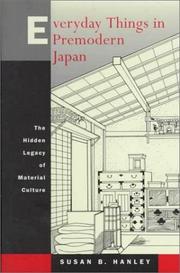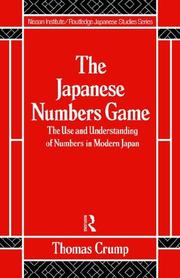| Listing 1 - 10 of 82 | << page >> |
Sort by
|
Book
ISBN: 4061157205 Year: 1973 Publisher: 東京 講談社
Abstract | Keywords | Export | Availability | Bookmark
 Loading...
Loading...Choose an application
- Reference Manager
- EndNote
- RefWorks (Direct export to RefWorks)
Book
ISBN: 2866450213 Year: 1986 Publisher: Paris : Editions du Félin,
Abstract | Keywords | Export | Availability | Bookmark
 Loading...
Loading...Choose an application
- Reference Manager
- EndNote
- RefWorks (Direct export to RefWorks)
J4150 --- Japan: Sociology and anthropology -- customs, folklore and culture --- Seasons --- Astronomical geography --- Astronomy --- Climatology --- Meteorology --- Japan --- Civilization.
Book
ISBN: 9782505008965 Year: 2011 Publisher: Bruxelles Dargaud Benelux. Kana
Abstract | Keywords | Export | Availability | Bookmark
 Loading...
Loading...Choose an application
- Reference Manager
- EndNote
- RefWorks (Direct export to RefWorks)
Book
ISBN: 9784901558433 4901558439 Year: 2009 Publisher: 京都 国際日本文化研究センター
Abstract | Keywords | Export | Availability | Bookmark
 Loading...
Loading...Choose an application
- Reference Manager
- EndNote
- RefWorks (Direct export to RefWorks)

ISBN: 0520204700 0520218124 Year: 1997 Publisher: Berkeley ; London : University of California Press,
Abstract | Keywords | Export | Availability | Bookmark
 Loading...
Loading...Choose an application
- Reference Manager
- EndNote
- RefWorks (Direct export to RefWorks)
Japan was the only non-Western nation to industrialize before 1900 and its leap into the modern era has stimulated vigorous debates among historians and social scientists. In an innovative discussion that posits the importance of physical well-being as a key indicator of living standards, Susan B. Hanley considers daily life in the three centuries leading up to the modern era in Japan. She concludes that people lived much better than has been previously understood--at levels equal or superior to their Western contemporaries. She goes on to illustrate how this high level of physical well-being had important consequences for Japan's ability to industrialize rapidly and for the comparatively smooth transition to a modern, industrial society. While others have used income levels to conclude that the Japanese household was relatively poor in those centuries, Hanley examines the material culture--food, sanitation, housing, and transportation. How did ordinary people conserve the limited resources available in this small island country? What foods made up the daily diet and how were they prepared? How were human wastes disposed of? How long did people live? Hanley answers all these questions and more in an accessible style and with frequent comparisons with Western lifestyles. Her methods allow for cross-cultural comparisons between Japan and the West as well as Japan and the rest of Asia. They will be useful to anyone interested in the effects of modernization on daily life.
Material culture --- Culture matérielle --- Japan --- Japon --- Social life and customs --- History --- Moeurs et coutumes --- Histoire --- J4150 --- J4140.60 --- Japan: Sociology and anthropology -- customs, folklore and culture --- Japan: Sociology and anthropology -- cultural history -- Kinsei, Edo, Tokugawa period, early modern (1600-1867) --- Social life and customs. --- J4150.60
Book
ISBN: 4788504510 Year: 1993 Publisher: 東京 新曜社
Abstract | Keywords | Export | Availability | Bookmark
 Loading...
Loading...Choose an application
- Reference Manager
- EndNote
- RefWorks (Direct export to RefWorks)
日本人の自己認識に決定的な影響を与えたベネディクトの『菊と刀』。刊行後四七年を経てなお読みつがれるその魅力とは何か?のちに提起されたさまざまな疑問・批判を整理しつつ、より開かれた視座から丹念に読み直し、その豊かな可能性を新たな日本文化論として再構築する。
J4100 --- J4150 --- J4120 --- J4150.80 --- J4000.80 --- Japan: Sociology, anthropology and culture in general --- Japan: Sociology and anthropology -- customs, folklore and culture --- Japan: Sociology and anthropology -- social psychology and social-cultural phenomena --- Japan: Sociology and anthropology -- cultural history -- Gendai (1926- ), Shōwa period, 20th century --- Japan: Social history, history of civilization -- Gendai (1926- ), Shōwa period, 20th century
Book
ISBN: 9064100292 Year: 1990 Publisher: Baarn Hollandia
Abstract | Keywords | Export | Availability | Bookmark
 Loading...
Loading...Choose an application
- Reference Manager
- EndNote
- RefWorks (Direct export to RefWorks)
Book
ISBN: 9062657303 9789062657308 Year: 1995 Publisher: Amsterdam In de Knipscheer
Abstract | Keywords | Export | Availability | Bookmark
 Loading...
Loading...Choose an application
- Reference Manager
- EndNote
- RefWorks (Direct export to RefWorks)
Aan de hand van de ervaringen van drie Japanners wordt een beeld geschetst van de ontwikkelingen in Japan in de laatste zestig jaar.
J4000.80 --- J4140.80 --- J3381 --- Japan: Social history, history of civilization -- Gendai (1926- ), Shōwa period, 20th century --- Japan: Sociology and anthropology -- cultural history -- Gendai (1926- ), Shōwa period, 20th century --- Japan: History -- Gendai, modern -- Shōwa period (1926-1989) --- J4150.80

ISBN: 0203318102 1280331607 0203038975 9780203318102 9780203038970 9781134935581 1134935587 9786610331604 661033160X 9781134935598 1134935595 9781134935543 1134935544 9781138009233 1138009237 9780415056090 0415056098 0415056098 Year: 1992 Publisher: London ; New York : Routledge,
Abstract | Keywords | Export | Availability | Bookmark
 Loading...
Loading...Choose an application
- Reference Manager
- EndNote
- RefWorks (Direct export to RefWorks)
An almost obsessional use of numbers characterizes Japanese popular culture. A wide variety of numerical formulae and strategies provide the means for explaining events and solving problems occurring in everyday life. These include such matters as the choice of the name for a child, ranking in almost any game or sport, the diagnosis and cure of illness or the decision to accept a new job. This text provides a general study of the field of Japanese popular numeracy. It introduces the reader to a world of numbers in which fortune-telling, the abacus and games involving numbers, as well as cur
Symbolism in folklore --- Numerals --- Symbolism of numbers --- Folklore --- Number symbolism --- Sacred numbers --- Symbolic numbers --- Mathematics --- Japan --- Civilization --- Social life and customs. --- J1741.70 --- J4150 --- Japan: Religion -- occultism -- numerology --- Japan: Sociology and anthropology -- customs, folklore and culture
Book
ISBN: 9004335153 9004336117 9789004336117 9789004335158 Year: 2016 Publisher: Leiden Brill
Abstract | Keywords | Export | Availability | Bookmark
 Loading...
Loading...Choose an application
- Reference Manager
- EndNote
- RefWorks (Direct export to RefWorks)
Mediated by Gifts is a collection of essays by top scholars on gifts, giving and the social and political forces that shaped these practices in medieval and early modern Japan. The international assemblage of authors provides new insights into these deeply ingrained practices. The essays focus on topics such as shogunal visits to shrines and temples, exchanges between the imperial house and the shogun, a physician and his patients, the shogun, his vassals his and his ladies, the merchant class and the shogunal government, and between scholars and their cosmopolitan circle of contacts. This virtually unexplored view of Japanese history provides new tools to better elucidate both historical and modern Japan. Contributors are Lee Butler, Andrew Goble, Kaneko Hiraku, Laura Nenzi, Ozawa Emiko, Cecilia Segawa Siegle, and Margarita Winkel.
Gifts --- Ceremonial exchange --- Gift exchange --- Exchange --- Rites and ceremonies --- Donations --- Presents --- Generosity --- Manners and customs --- Free material --- Political aspects --- History. --- Social aspects --- J4158 --- J4150.50 --- J4150.60 --- History --- Japan: Sociology and anthropology -- customs, folklore and culture -- gifts and offerings --- Japan: Sociology and anthropology -- cultural history -- Muromachi, Sengoku and Azuchi-Momoyama periods (1392-1615) --- Japan: Sociology and anthropology -- cultural history -- Kinsei, Edo, Tokugawa period, early modern (1600-1867)
| Listing 1 - 10 of 82 | << page >> |
Sort by
|

 Search
Search Feedback
Feedback About UniCat
About UniCat  Help
Help News
News